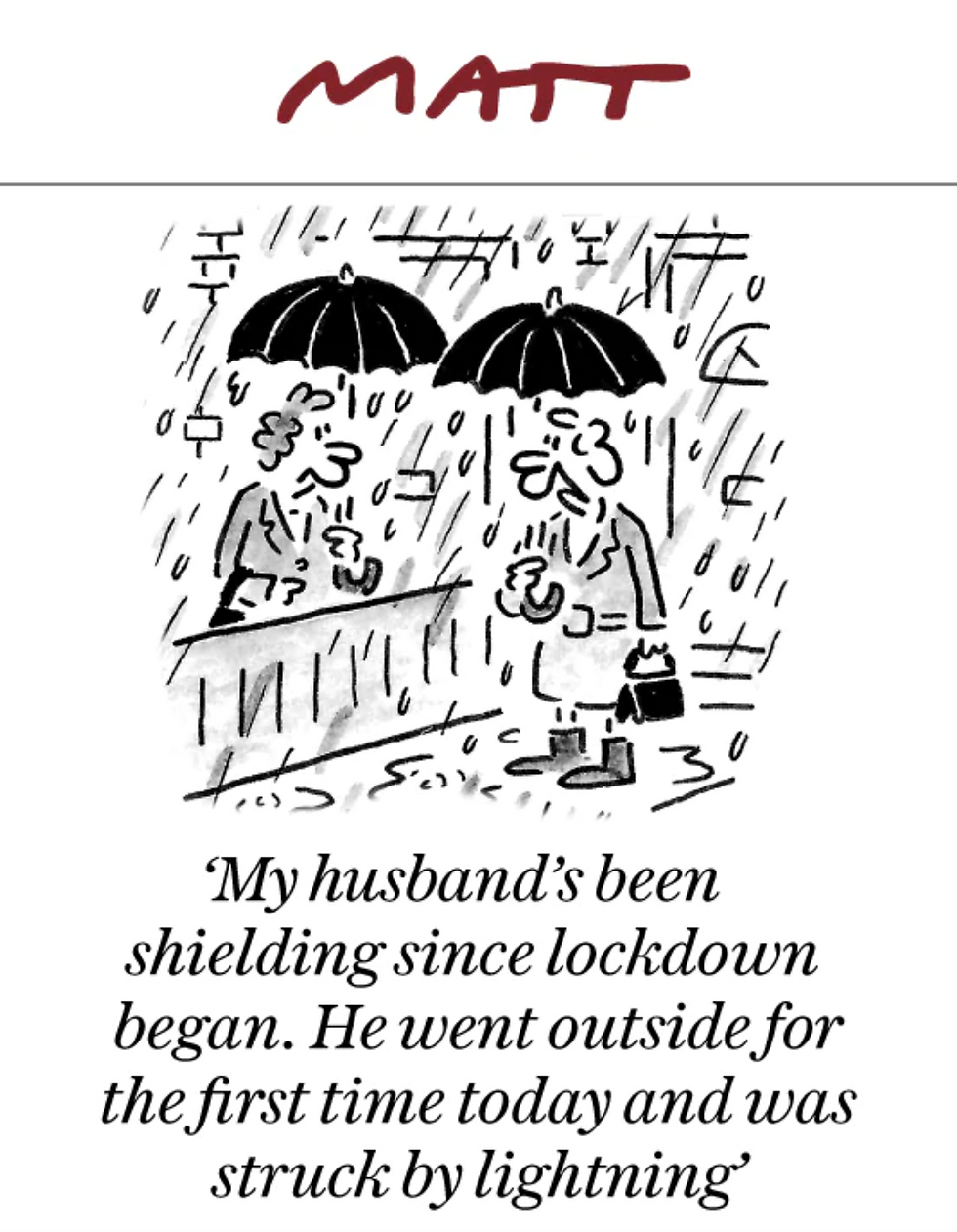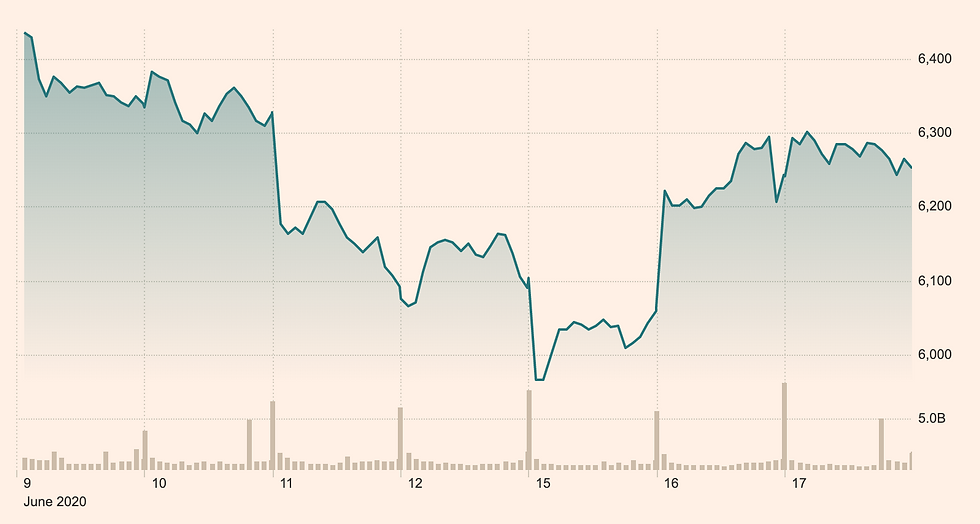- Charlotte Street Partners

- Jun 18, 2020
- 6 min read
The big reveal
Written by Katie Stanton, Associate Partner
Edited by Sabina Kadic-Mackenzie, Associate Partner
Good morning,
This crisis has been nothing if not revelatory. Like a flasher in a trench coat or a sculptor exhibiting some vast mass cloaked in silk; with one swift tug of the drape, the artiste’s spindly fingers expose a reality we have long disregarded: sweeping structural inequality.
I’m not talking so much about the extreme and widening gap between our richest and poorest – a devastating problem in its own right, and one that I can’t hope to broach in 400 words – but about that day-to-day unfairness that exists within functioning companies, systems, and communities.
Over the past few months, mundane, generic injustice has been laid bare. The crux of the issue, on a practical level, is that leaders, executives and office workers can function and earn from the relative safety of their home (I include myself in this camp), while factory workers, carers, builders, cleaners, manufacturers, skilled and unskilled labourers simply cannot.
And we have quite abruptly realised that those taking the biggest risk, those workers who are most essential to our survival, are also the lowest paid.
Nowhere else is this gap more apparent than in the healthcare system. Cleaners are key to infection control, and will be more fundamental than ever as hospitals grind back into action and begin to trawl through the huge backlog of operations and treatments.
Now that’s not to say that the chief executives of health boards and the like aren’t under extreme stress and playing a vital part in the recovery of our health service; of course, they are. But they are not routinely putting their lives on the line from their home office.
This same disparity exists across sectors in most businesses. And that’s before we’ve added into the mix the horrible reality that those in lower paid positions are much more likely to be black or minority ethnic (BAME), and so are more susceptible to both the virus itself and its economic implications, fuelling already entrenched inequality.
This crisis has just made it all the more visible; an intense moment of clarity and revelation; and an opportunity then for leaders to reflect on where the value lies in their business or organisation and consider implementing structures that reward those exposing themselves to the most risk.
From individual pay rises to restructuring, profit sharing to gifting shares; all could help to invest employees in the success of a business, reward hard work and create more sustainable, equal growth.
Of course, each organisation is different, and solutions will need to be nuanced accordingly. But fail to recognise and act on something that is so plain to see now, and I fear that the chance will pass us by; unfairness will become an enduring fixture, and our opportunity to shift the global economy towards one that recognises the need to care for our people, wellbeing and planet will be nothing more than a flasher in the pan.
News
According to ex-national security adviser John Bolton, Donald Trump tried to enlist China’s president Xi Jinping to help him secure re-election. It’s reported that the US president wanted China to use its economic capability to buy agricultural produce from US farmers.
More than 1,600 paediatricians have called on the prime minister to reopen schools or risk “scarring the life chances” of a generation of children. In an open letter to Boris Johnson, they said that vulnerable children were suffering while schools remained shut during lockdown.
The governing body of Oriel College at Oxford University has agreed to remove a controversial statue of coloniser Cecil Rhodes, although campaigners have said that protests will continue until it is gone. The college says there will need to be consultations over planning regulations before it can be taken down.
Meanwhile pub chain Greene King and insurer Lloyd’s of London have apologised for their historic links to the slave trade and agreed to donate to charities representing BAME groups.
Business and economy
The EU has opened an in-depth antitrust probe into the $50bn merger of Fiat Chrysler and France’s PSA, amid concerns that the deal may “reduce competition” in the small commercial vans market. (£)
Downing Street’s plan to announce guidelines for the reopening of England’s hospitality sector has been delayed by a government review into whether it is possible to reduce the two-metre social distancing rule.
The administrator of Neil Woodford’s failed investment fund has been accused of selling its biotechnology stakes too cheaply. Acacia Research has now started to sell on some of the assets that it agreed to buy for £224m a fortnight ago, with at least one stake offloaded for significant profit. (£)
Columns of note
Writing in theNew Yorker, Kyle Chayka reveals how the coronavirus will reshape architecture. Chayka explains that many of the hallmarks of modernist architecture can be understood as a consequence of the fear of disease – we have long been tailoring buildings to help us kill off tuberculosis, for example. Will this virus then usher in a period of defensive architecture, full of barriers and Perspex? (£)
Paul Ormerod details how slavery is an economic disaster as well as a moral one in City AM. While individuals may historically have become rich from the salve trade, societies did not. The fundamental problem is that an economy based on slavery – he uses Rome as the exemplar – has little incentive to adopt new, more efficient processes.

Source: The Telegraoh
Markets
What happened yesterday?
The FTSE 100 closed higher yesterday, although lost some ground due to market fears over a second wave of coronavirus in China. London’s blue-chip index closed up 0.18%, despite the release of figures earlier in the day which showed UK inflation fell to a four-year low in May. The Consumer Price Index dropped to 0.5%, as demand slowed during lockdown.
The Bank of England’s Monetary Policy Committee is due to meet later today and is expected to announce a ramping up of its quantitative easing programme.
In company news:
HSBC has announced the revival of a plan to cut 35,000 jobs. The programme was prompted by a fall in profits in the first quarter and a grim economic outlook but was put on pause in March due to the coronavirus.
The multimillionaire founder of Amigo Loans, James Benamor, will sell his entire 60% stake in the guarantor lender after he lost a battle to remove its board of directors. (£)
UK energy company SSE insisted yesterday that it has put together a “comprehensive plan” to maintain dividends despite the coronavirus crisis, including a £250m cut to spending.
Lufthansa has warned that a €9bn bailout from the German government might be at risk, after its biggest shareholder, Heinz Hermann Thiele, signalled that he might reject the deal in a vote later this month.
Stagecoach has failed in its attempt to sue the UK government after being banned from bidding for three rail franchises last year in a dispute over pension liabilities.
What's happening today?
Finals National Grid
Interims
Blue Prism
Caretech Hldg
Safestore
AGMs Aurora Investment Trust
Block Energy
Bluejay Min
Foresight Solar
Horizon Discovery
Huatai Secs.
Immupharma
Impact Health
Intelligent Ultrasound
IP Group
Jadestone Energy
Michelmersh Brick Holdings
Middlefield Prf
RBG Holdings
RHI Magnesita
Shield Thera
Ten Ent Grp
Tremor Int
Union Jack
Vietnam Enterprise Investments
UK Economic Announcements
(12:00) BoE Interest Rate Decision
Int. Economic Announcements
(13:30) Continuing Claims (US)
(13:30) Initial Jobless Claims (US)

Source: FTSE 100, Financial Times
Did you know?
Scientists estimate that there are 36 contactable alien races in our galaxy.
Parliamentary highlights
House of Commons
Oral questions
International trade
Business statement
Business questions to the leader of the house – Jacob Rees-Mogg
Motion
Statutory Instruments Relating to the Draft African Development Bank (Fifteenth Replenishment of the African Development Fund) Order 2020; The Draft African Development Bank (Further Payments To Capital Stock) Order 2020; And The Draft African Development Fund (Multilateral Debt Relief Initiative) (Amendment) Order 2020 – Anne-Marie Trevelyan
Statutory Instruments Relating to the Draft International Development Association (Nineteenth Replenishment) Order 2020; And the Draft International Development Association (Multilateral Debt Relief Initiative) (Amendment) Order 2020 – Anne-Marie Trevelyan
Backbench business
Debate on a Motion on the Effect of Covid-19 On Black, Asian and Minority Ethnic Communities – Dawn Butler
Adjournment
Education standards in Stoke-on-Trent – Jack Brereton
House of Lords
Oral questions
Implementation of the COVID-19 track and trace system – Baroness Anelay of St Johns
Recruitment of nurses onto degree courses beginning in September 2020 – Lord Clark of Windermere
Establishing an independent inquiry into the Post Office’s Horizon accounting system – Lord Arbuthnot of Edrom
Paper by Professor Francis Green 'Schoolwork in lockdown: new evidence on the epidemic of educational poverty' and publishing guidance on what is an acceptable level of online support for pupils – Lord Addington
Orders and regulations
Civil Aviation (Insurance) (Amendment) (EU Exit) Regulations 2020 – Baroness Vere of Norbiton
Over the Counter Derivatives, Central Counterparties and Trade Repositories (Amendment, etc., and Transitional Provision) (EU Exit) Regulations 2020 – Baroness Penn
Financial Services (Miscellaneous Amendments) (EU Exit) Regulations 2020 – Baroness Penn
Scottish Parliament
First minister statement
Covid-19 next steps
Portfolio questions
Constitution, Europe and external affairs
Economy, fair work and culture
Education and skills
Business motions

Comments